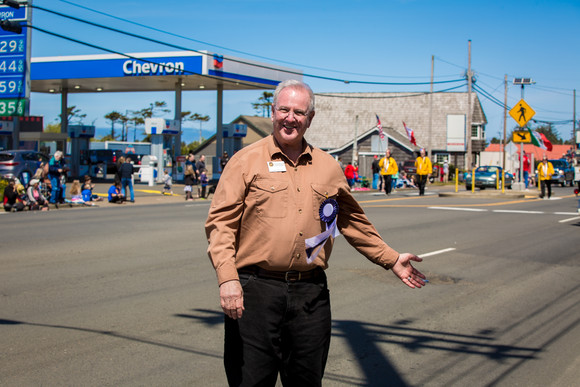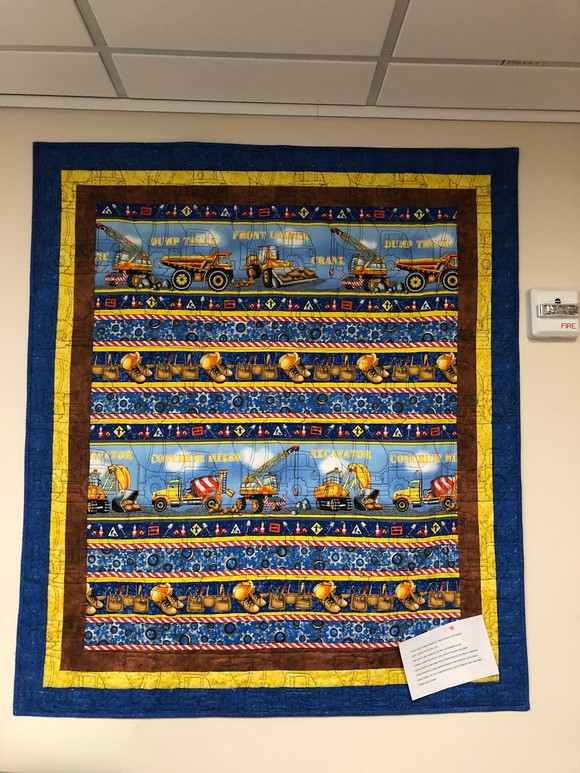
Hello Friends,
This weekend, I walked the Newport Loyalty Days Parade, shaking hands, meeting children, petting dogs, and talking briefly with people and families that had come out to celebrate our coastal heritage and the sunshine. This was the first of six local parades I’ll walk this summer and I was particularly pleased to have students tell me on four different occasions they had met me in the Capitol. I then rushed back to Lincoln City and dressed up for the Cultural Center’s “Culture of Course” gala dinner.
Senator Roblan and I will host our fourth Town Hall series for this legislative session at 7:30 a.m. Friday morning, May 10th. The Senator and I will be here at the Capitol. You can join us live via video conference from our Community College campuses in Lincoln City or Newport.
For those of you in Tillamook County, I will host a joint Town Hall with Representative Tiffiny Mitchell this Saturday, May 11, at 2pm at the Tillamook Library. With big issues moving, this is an excellent time to meet with us for questions or suggestions.

Student Success Act
Oregon pays for schools primarily with income taxes. When the economy is good, we invest; when the economy slumps, we cut. The result is a funding roller coaster. Our schools are falling behind.
This week, HB 3427, the Student Success Act, passed out of the House. Oregon has waited too long for a solution to education funding. Our class sizes are too large, our graduation rates too low and our class year too short. This bill includes necessary support for pre-school and early learning programs, funding for career and technical education, and more resources for students and teachers. It includes a plan to measure classroom performance results. It gives our kids and grandkids the education they deserve to succeed.
Whether you have kids in our schools, are a business looking for employees, or are retired and increasingly dependent on others for services and support, we all have a stake in quality education. Simply said, this bill was long overdue.
The proposal will add $1 billion each year to K-12 education. (Not the $5.67 billion I’ve been reading about on social media.) The Student Success Committee toured the entire state before preparing a proposal designed to address shortfalls and measure the results.
I’m particularly pleased the bill addresses pre-school and early learning programs. Too many of our children arrive at school challenged. Too many arrive from homes struggling with income insecurity, food insecurity or health insecurity. Too many are struggling with mental health problems, abuse or neglect. Twenty percent of the students in Lincoln County schools are listed as “homeless”. That’s one-in-five –a statistic that, frankly, I’m ashamed of.
We need to create an environment where our kids and grandkids arrive at school ready for the first lesson and not just anxious for the first meal.
While HB 3427 is a well-crafted compromise bill, it isn’t perfect. I would like more attention directed to farms and fisherman. I would like higher deductions for our smaller businesses. And I would like more support for our community colleges. We discussed the costs of this bill for over 6 hours on the floor. And as you can see in my speech, I believe the cost of doing nothing is far greater than the cost of doing what is necessary.
Speaking on the House floor for the Student Success Act
Certainly this proposal is complex, controversial, and for some, expensive. The measure proposes a tax of about half of one percent on business activity in Oregon. Groceries, health care and fuel are exempt.
In simple terms, here is how it would work:
1) The first million dollars of sales will be tax-exempt. This is designed to screen out smaller businesses. Ninety per cent of Oregon firms will not be affected at all.
2) Businesses with more than $1 million in sales can deduct 1/3 of their costs of goods or labor – whichever is higher. This is intended to minimize the effect of taxes “stacking” when a business buys products or services from another business.
3) Oregon individual income taxes will be reduced. This is intended to offset the possible increase in prices if tax costs are passed along to consumers.
How could the tax affect your business? As I said earlier, if your sales are under $1 million, it won’t affect you at all. For larger businesses, the results will vary depending on their industry, structure, costs, and current tax rate. Here is an example for one business with $2 million in sales.
Total sales in Oregon: $2,000,000
Less $1 million exemptions: ($1,000,000)
Equals gross taxable sales: $1,000,000
total labor $1,400,000
total cost-of-goods $300,000
other costs $200,000
Net profit $100,000
Less .35 x labor or CGS: ($490,00)
($1.4M x .35 = $490k)
Equals net taxable activity: $510,000
($1M – $490k = $510k)
Taxable activity x tax rate of .0057 $2,907
($510k x .0057 = $2,907)
Less .22 (deduction from federal taxes) ($640)
($2907 x .22 = $640)
Less .0875 (deduction from state taxes) ($254)
($2907 x .0875 = $254)
Equals final new tax: $2,013
($2907 – $640 – $254)
Is the plan perfect? Certainly not! I argued that the million dollar “floor” should be higher since many small businesses have sales over that threshold. I also was part of a group that successfully argued deductions should be more than the 25% originally proposed. The amount was increased to 35% but I still feel it should be higher. And I remain concerned about how the tax may affect “fleets and farms” – our fishing and dairy industry.
The proposal now moves to the Senate. We’re still researching and considering amendments. PERS and the expanding obligation of pension cost is next on the agenda.
Coastal Art Displays
As part of our continuing Coastal Art and Artists Gallery in our Salem office, this month we are presenting the Tuesday Stitchers from Pacific City. We’ve displayed paintings, photographs, ceramics, and now quilt art. And what makes these pieces particularly special is that the Stitchers donate each to the Caring Cabin – a residential facility in Tillamook to support children with cancer. One awaits each child who walks through the door. Over 1,000 exquisite hand crafted quilts have been donated so far. We’re proud to have some examples on display at the Capitol.

Vaccinations
This week we voted on one of the most contentious proposals of the 2019 session. HB 3063 will eliminate philosophical and religious exemptions to vaccinations and require that students be vaccinated or have a medical exemption in order to attend our schools.
This is an impossible choice, but our House rules don’t allow us to abstain from voting. On one hand, we have questions of personal freedom and the right of parents to control their children’s healthcare. On the other side, we have concerns for public health and public safety. In our district we have pre-school children not yet vaccinated, we have a large retired population whose vaccinations may have expired, and we have some schools where the un-vaccinated rate exceeds 50%. With the recent reemergence of measles in the northwest, we see how the consequences of this decision could be severe.
The lobbying on this measure has been unprecedented during my time in the Legislature. Last Thursday alone, my office received over 3,000 emails. The phone rang every few minutes all day. We had citizens coming to the office, rallying on the Capitol steps, waving signs at the entrance to the parking garage, and lining access to committee rooms or the House chamber in an informational gauntlet. The few letters we have received from our district have been evenly split on the question. The very great majority of contacts have been from outside the district.
We encourage you to write to us on any issue. But when you do, please note where you live along with your name. Our priority is to respond to the people of our coastal and coast range district.
—————————————————-
Many of the issues we deal with in Salem are difficult or contentious. But the work is important. Thank you for honoring me with the responsibility of representing you in our State Capitol.
Warm Regards,
Representative David Gomberg
House District 10
email: [email protected]
phone: 503-986-1410
address: 900 Court St NE, H-471, Salem, OR, 97301
website: http://www.oregonlegislature.gov/gomberg





